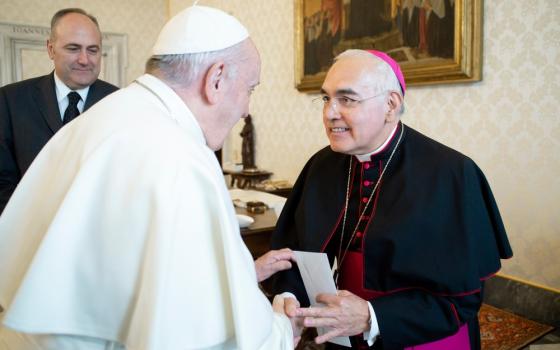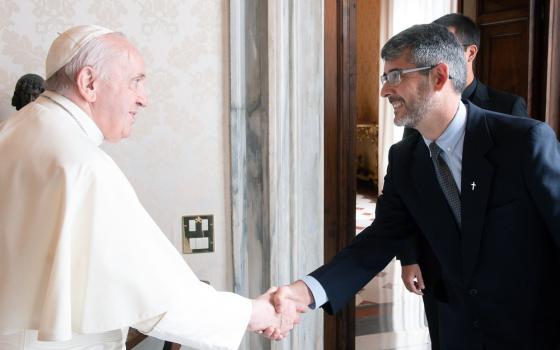NEWARK, N.J. -- Teachers at Queen of Angels School here have pressed ahead with lessons on the papacy in preparation for Pope Benedict XVI's first U.S. visit this month, even though most students there aren't Catholic.
"To be able to spread the Catholic faith, this is an excellent time," principal Everlyn Hay said. "This is definitely a teachable moment of the best kind."
The demographics at Queen of Angels are the norm in many urban Catholic schools, where the church is struggling to continue its educational mission.
An alarming number of schools have closed, and the population of Catholic school students has dropped dramatically. In New Jersey alone, the church has lost 100 schools and 40,000 students in the last decade.
Despite the problems, the pope's upcoming visit has energized the faithful as they prepare for a leader who has tried to shift the focus away from flagging numbers and onto the depth of worship by those who remain.
"He has been concerned Catholic schools do the best they possibly can to help students and their families grow in their faith," said Monsignor Michael Corona, the education director in the neighboring Metuchen diocese.
"Hearing from the pope on a topic dear to our hearts," he said, "will certainly be an wonderful affirmation of something we believe in."
New Jersey, a heavily Catholic and immigrant state that still boasts 345 schools with 112,000 students, is as good a place as any to see the challenges facing parochial education in America. Forty-three percent of U.S. Catholic schools are located in urban areas like Newark.
Nationwide, the situation has grown troubling enough that President Bush has called a White House summit later this spring, concerned a vital player in urban education is struggling.
According to figures from the National Catholic Educational Association, the number of schools dropped from 8,293 to 7,498 between 1996 and 2006. Total enrollment fell from 2.64 million to 2.32 million. During the 2006-2007 school year, 212 schools were closed or consolidated, while 36 new schools opened.
As city populations have shifted from immigrant Italians, Poles and other largely Catholic ethnic groups, the schools they built have seen their populations shift to non-Catholic. As Catholics moved to the suburbs, their churches were less likely to open new schools, in part, because they competed with strong public schools.
In the cities, the remaining parochial schools were long considered outposts in areas with troubled public schools, but it has been more difficult for dioceses to subsidize them over the past decade.
In the past 10 years, the Newark archdiocese has closed a quarter of its schools and lost a third of its students. Next fall, another school will close and eight will be consolidated. However, the archdiocese last year did open Christ the King High School, a specialized work-study school that is the archdiocese's first new urban school in 30 years.
"It's not just looking at one box anymore, but seeing what will work in each ... community," said Kevin Hanbury, the archdiocese vicar for education. "It's not one size fits all anymore."
Catholic high schools have been more stable, with some thriving, say diocesan officials, and many suburban schools have defied the trend. Still, some officials are nervous.
"We're surviving, as all Catholic schools are trying to do," said Sister Marie Antonelli, principal of Holy Spirit School in Pequannock, N.J. "You certainly need to keep a watchful eye, lest you fall."
While the Vatican has tended to stay out of the fiscal woes besetting U.S. Catholic education, Pope Benedict has spoken about reinvigorating the spiritual side of Catholic education worldwide.
During his upcoming visit, the pope plans to speak on April 17 with 200 college heads and diocesan superintendents. Corona, from the Metuchen diocese, will be in the audience and sees the speech as a great opportunity to re-establish the core mission of Catholic schools.
"We have Catholic schools to make Jesus present in very concrete ways," he said.
Corona said school officials may have to learn how to better market the strong values they preach.
At Queen of Angels, enrollment has dropped to fewer than 200 students, at least one-third smaller than at its peak. Only about a dozen students are Catholic, and the vast majority are from other Christian denominations and there even are a few Muslims.
In a daily religion class recently, fifth-grade teacher Chrystal Collins-Gardner led a lesson about the pope's role in the church. The students fumbled a bit on the current pope's German last name, Ratzinger, but their hands flew up to identify him as the 16th Pope Benedict.
The students listened raptly as their teacher asked the meaning of Jesus telling his disciple Peter to feed his sheep.
"Jesus wants Peter to spread the word of God," answered fifth-grader Syedah Wicker.
Collins-Gardner smiled and turned to the class: "And the pope is another Peter, isn't he? He is spreading the word of God."
(John Mooney writes for The Star Ledger in Newark, N.J.)



